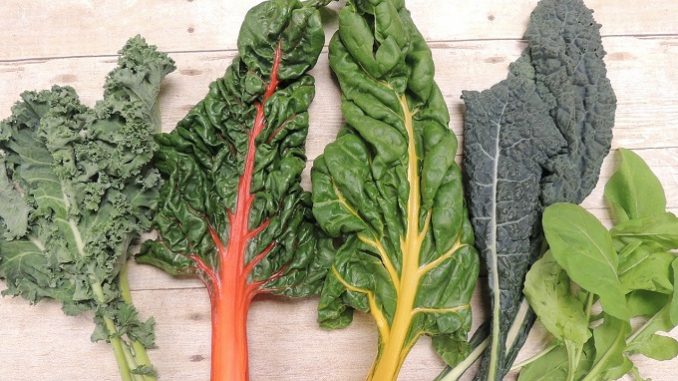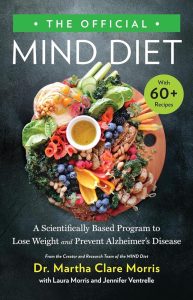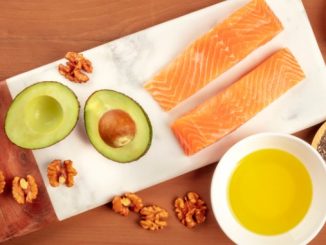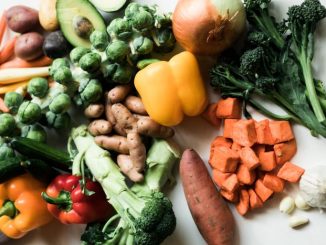
Eating certain foods while limiting others can help people living with Parkinson’s. Research suggests eating 10 brain healthy foods, such as green leafy vegetables, as part of the MIND diet has been associated with slower cognitive decline, a decreased risk of parkinsonism and a slower rate of parkinsonism progression. Researchers believe that the antioxidant and anti-inflammatory effects of foods encouraged in the MIND diet may help slow the loss of brain function that can occur with aging. Meal planning on the MIND diet is simple and easy. Plus, benefits have been shown when the diet is only moderately followed.
The MIND diet was created to help improve brain function and prevent dementia and contains dietary components shown to be neuroprotective. In developing this diet, researchers combined foods from the Mediterranean and DASH diets that have been shown to benefit brain health in previous research. The MIND diet emphasises natural plant-based foods and limited intakes of animal and high saturated fat foods. Research suggests adhering highly to this diet has been associated with lower rates of developing parkinsonism and with slower progression of parkinsonian signs. Parkinsonian signs assessed as part of this research were bradykinesia (slowness of movement), parkinsonian gait, rigidity (stiff or inflexible muscles) and tremors. Among the MIND diet components are 10 brain healthy foods. As well as eating these 10 foods limiting red meat, butter, cheese, pastries/sweets and fried/fast food is also suggested.
10 foods to eat if you have Parkinson’s
- Green leafy vegetables
- Other vegetables
- Berries
- Nuts
- Whole grains
- Fish
- Beans
- Poultry
- Olive oil
- Wine
1. Green leafy vegetables: eat at least 1 serving per day e.g. Spinach, Kale, Bok Choy, Collard greens, Romaine lettuce, Rocket, Endive etc. Green leafy vegetables contain nutrients linked to better brain health such as folate, vitamin E, carotenoids and flavonoids. One serving a day has been shown to slow brain aging.
2. Other vegetables: eat at least 1 serving of another vegetable per day e.g. capsicum, carrot, squash, broccoli, celery, potato, peas, tomatoes, beans, beetroot, corn, zucchini, eggplant etc.
3. Berries: eat at least 2 servings per week e.g. blueberries and strawberries. Both the Mediterranean and DASH diets recommend eating a lot of fruit. Fruit intake has not been correlated with improved brain function but eating berries has been. Thus, the MIND diet encourages regularly eating berries.
4. Nuts: eat at least 5 servings per week e.g. cashews, pecans, macadamia nuts, walnuts, etc. Nuts contain good amounts of vitamin E which has brain-protective qualities.
5. Whole grains: eat at least 3 servings per day e.g. wholegrain bread, brown rice, Quinoa, rolled oats etc.
6. Fish: eat 1 serving per week e.g. salmon, sardines, mackerel which are rich sources of long-chain omega-3 fatty acids. Avoid fried fish. MIND diet researchers did not find evidence that consuming fish more than once a week added extra benefits for the brain.
7. Beans: eat at least 3 servings per week e.g. lentils, chickpeas, black beans, red kidney beans etc. Beans, also called legumes, are a good source of antioxidants and are low in saturated fat. To help ease any discomfort, introduce beans gradually and be sure to drink enough water and exercise regularly to help your gastrointestinal system handle the increase in dietary fibre.
8. Poultry: eat at least 2 servings per week e.g. chicken or turkey. Fried chicken/turkey is not suggested.
9. Olive oil: use as your main cooking oil. Choose extra virgin olive oil.
10. Wine: drink no more than 1 standard drink per day e.g. red wine. It is important to know that with every drink over this level, you are increasing the risk of cognitive decline and dementia as well as heart disease and breast cancer. Given the risks of alcohol, it is not a good idea to start drinking for the possible brain benefit. Always talk to your doctor if drinking alcohol is appropriate for you.
10 foods to eat if you have Parkinson’s meal/snack ideas
- Salmon, cooked in extra virgin olive oil, served with spinach, capsicum and Quinoa.
- Sardines, cooked in extra virgin olive oil, served with Kale, carrots and brown rice.
- Chicken with vegetables including Bok Choy stir fried in extra virgin olive oil, served with brown rice, sprinkled with cashew nuts.
- Roasted turkey legs served with salad including rocket and tomatoes, drizzled with extra virgin olive oil.
- Lentils with vegetables including collard greens stir fried in extra virgin olive oil, served with Quinoa, sprinkled with pine nuts.
- Make a smoothie and include ingredients such as green leafy vegetables, berries, rolled oats, nut paste etc.
- Add berries and chopped nuts to breakfast cereal such as rolled oats.
- Serve berries on top of whole-grain pancakes.
- Bake berries into wholegrain muffins.
- Snack on a small handful of mixed nuts.
- Combine dried berries to a nut and seed mixture and eat as a snack.
Final thoughts
There are 10 foods to eat if you have Parkinson’s as part of the MIND diet. This pattern of eating is easy to follow and has many potential benefits for brain health. The MIND diet encourages intakes of vegetables, berries, nuts, olive oil, whole grains, fish, beans, poultry, and a small amount of wine. Centre your meals around these 10 brain healthy food groups and enjoy.
Want to learn more?
From the creator of the MIND diet and author of Diet for the MIND, The Official MIND diet is a practical, day-by-day guide to improving your brain health for life by adjusting what you eat. You’ll learn:
- What foods to eat and limit to protect your brain from cognitive decline – with more than 60 recipes.
- How to seamlessly incorporate these foods into your routine.
- How to effectively stay on track and maintain your health and nutrition needs.

Sources
-
Morris MC., Tangney CC., Wang Y., et al., MIND diet slows cognitive decline with aging. Alzheimers Dement 2015;11:1015–1022.
-
Morris MC., Tangney CC., Wang Y., Sacks FM., Bennett DA., Aggarwal NT. MIND diet associated with reduced incidence of Alzheimer’s disease. Alzheimer’s Dement. 2015;11:1007–14
-
Agarwal, P., Wang, Y., Buchman, A.S. et al. MIND Diet Associated with Reduced Incidence and Delayed Progression of Parkinsonism in Old Age. J Nutr Health Aging 22, 1211–1215 (2018).
-
Morris MC., Evans DA., Tangney CC., Bienias JL., Wilson RS., Associations of vegetable and fruit consumption with age-related cognitive change. Neurology. 2006; 67:1370–1376. https://pubmed.ncbi.nlm.nih.gov/17060562/
-
Kang JH., Ascherio A., Grodstein F., Fruit and vegetable consumption and cognitive decline in aging women. Ann Neurol. 2005; 57:713–720.
-
Devore EE., Kang JH., Breteler MM., Grodstein F., Dietary intakes of berries and flavonoids in relation to cognitive decline. Ann Neurol. 2012 Jul;72(1):135-43. doi: 10.1002/ana.23594. Epub 2012 Apr 26.
-
Fenn A., MIND diet describes 10 brain-healthy food groups, Brain health kitchen.



